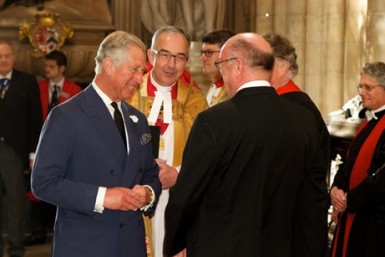
Abbey service celebrates Tavener’s faith and music
From Church Times
AN EXTENDED service of thanksgiving was held in Westminster Abbey in the presence of the Prince of Wales on Thursday to celebrate the life and work of the composer Sir John Tavener, who died on 12 November last year, two months short of his 70th birthday.
Nine works by the composer, spanning several decades, were sung by soloists and the choir of Westminster Abbey, under its Director of Music, James O’Donnell. These included the celebrated setting of William Blake “The Lamb” (1982), the plaintive Funeral Ikos and a setting of the Lord’s Prayer.
The actor Simon Russell Beale read from Isaiah 35 (“. . . and sorrow and sighing shall flee away’). The composer’s elder daughter, Theodora, read a text, “Ninety-Nine Words”, in which Tavener encouraged his three children to “remember God every day” and “aspire to the state of bliss which inhabits all things”.
The Dean of Westminster, the Very Revd Dr John Hall, presided, and Archbishop Gregorios of Thyateira & Great Britain led the middle section of the service, spoken in ringing Greek, and centring on prayers “for the repose of John, God’s servant, who has fallen asleep”.
Sir Nicholas Kenyon, in his address, praised Tavener’s challenging early as well as questing later works, recalling that the composer – “vigorous, opinionated, accessible, by no means monkish, a hugely attractive late 20th century person” – made an unusual spiritual journey, from Presbyterianism (as a young church organist in London) via Catholic mysticism and Anglicanism to Greek Orthodoxy, which he embraced in his later years. This, with Sufi, Jewish, and latterly Hindu texts, greatly influenced his music, and gave it its “unique” and “hypnotic” quality.
Sir Nicholas also recalled Tavener’s other passions, notably for “upmarket cars”, and his unceasing and infectious laughter.
The countertenor Andrew Watts, with the oboist Nicholas Daniel and the Britten Sinfonia under Stephen Layton, performed The Hidden Face, a work of sublime serenity, then explosive force, dating from 1996. Other performers who made an eloquent contribution were the soprano Patricia Rozario, the cellist Steven Isserlis, and the violinist Thomas Gould, associate leader of the Britten Sinfonia.
Westminster Abbey’s assistant organist, Martin Ford, played Bach before the service, and at the end the Abbey’s Sub-Organist, Daniel Cook, played “Transports de joie d’une âme devant la gloire du Christ” from Olivier Messiaen’s L’Ascension, which made a thrilling conclusion.
Among the congregation were the composers John Rutter, David Matthews, and Gabriel Jackson, the countertenors James Bowman and Michael Chance, the tenor Ian Partridge, the conductor Harry Christophers, the BBC Radio 3 presenter Donald Macleod, and Tavener’s publisher, James Rushton of Chester Music, who had written a biography of the composer for the service programme.
A retiring collection was taken for the John Tavener Memorial Fund, which aims to preserve the composer’s manuscripts, further religious education and tolerance through music, and support research into Marfan’s disease, the genetic disorder from which Tavener long suffered.
